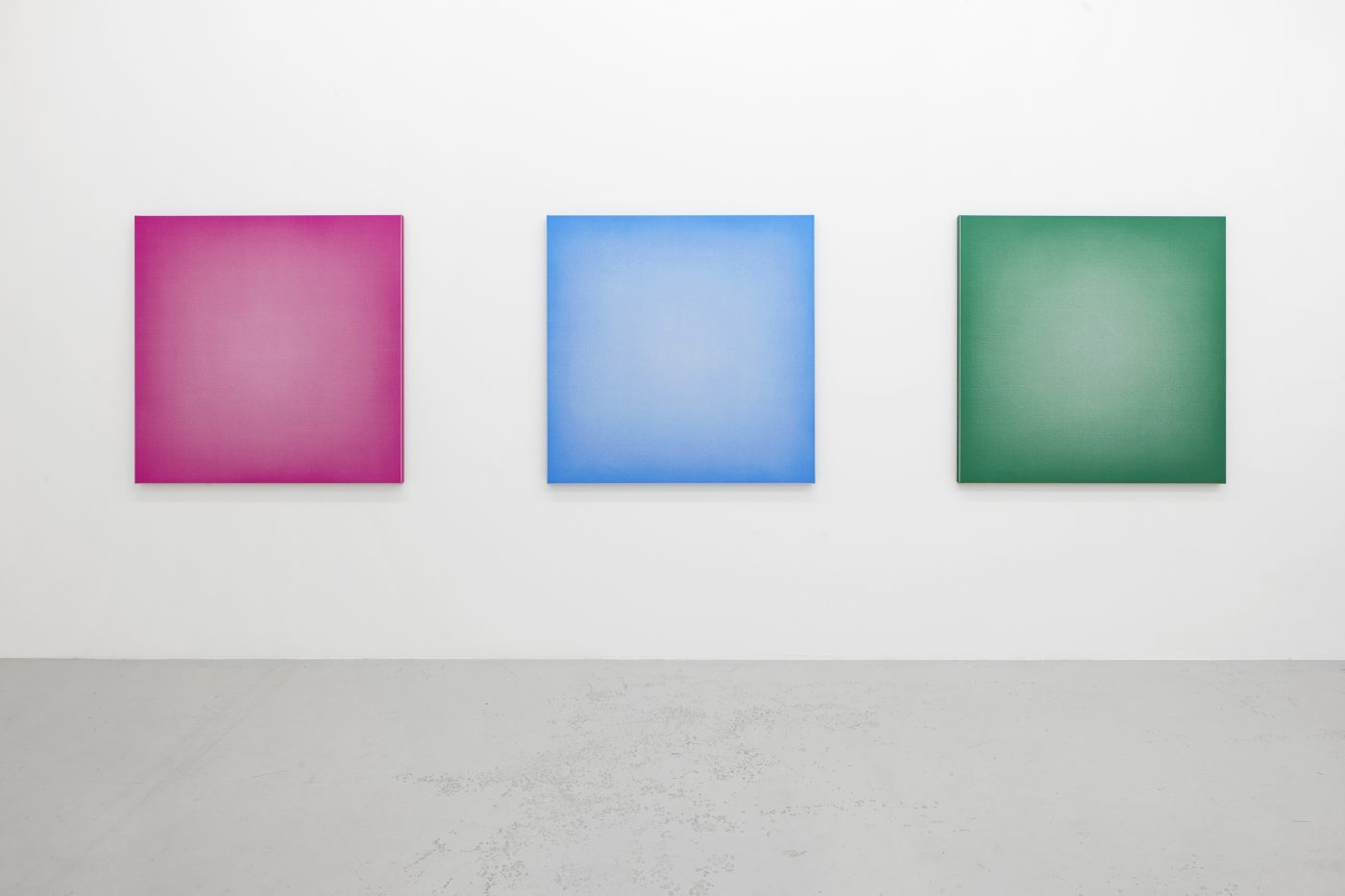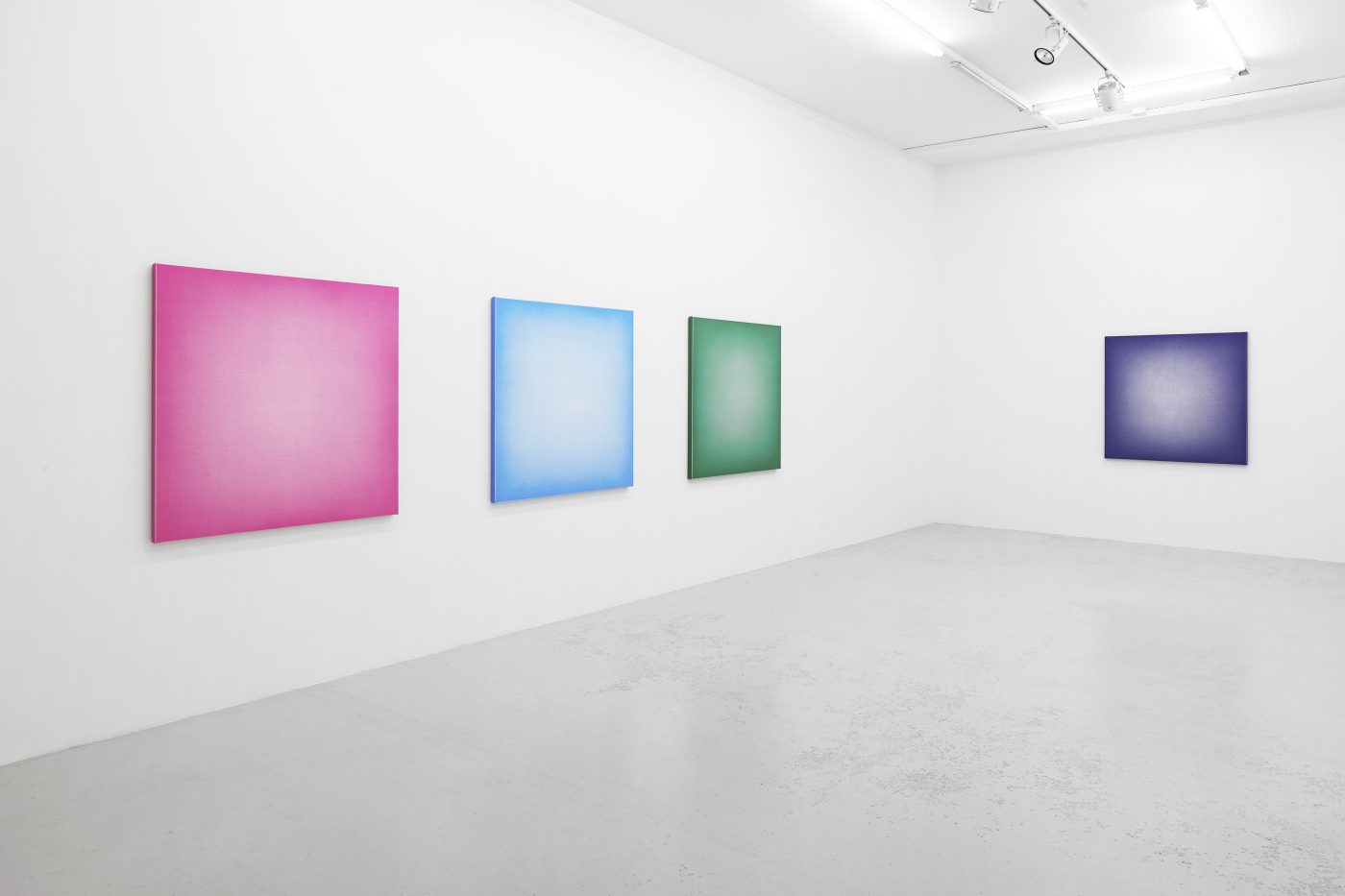The galerie lange + pult is pleased to present Thomas Wachholz’s first solo exhibition in Zurich.
With his latest alcohol works, the German artist radically explores the dimensions of everyday materials, processes and techniques, thus throwing light back onto the perception of our design spaces of the everyday.
Under the title “Soft painting” Wachholz covers the gallery walls with a series of large-format digital paintings in a monochrome CMYK spectrum, which he alchemistically processes layer by layer with alcohol. This very slow process dissolves the printed surface and drives the picture in soft color transitions to indefinite, immaterial reasons.
The generative works appear very simple at first, but of course the action and what it leaves behind is much more complex and more than the sum of its parts: the industrially produced seemingly perfect surface meets a human hand, which evokes a chemical reaction through a meditative removal of the paint. Despite their serial effect, their traces on the image carrier result in divergent canvases that reveal that they were nevertheless executed by a human body.
The materiality of the printing ink and the process of printing, on the other hand, cannot be separated from their everyday significance of
LOAD MORE +
The galerie lange + pult is pleased to present Thomas Wachholz’s first solo exhibition in Zurich.
With his latest alcohol works, the German artist radically explores the dimensions of everyday materials, processes and techniques, thus throwing light back onto the perception of our design spaces of the everyday.
Under the title “Soft painting” Wachholz covers the gallery walls with a series of large-format digital paintings in a monochrome CMYK spectrum, which he alchemistically processes layer by layer with alcohol. This very slow process dissolves the printed surface and drives the picture in soft color transitions to indefinite, immaterial reasons.
The generative works appear very simple at first, but of course the action and what it leaves behind is much more complex and more than the sum of its parts: the industrially produced seemingly perfect surface meets a human hand, which evokes a chemical reaction through a meditative removal of the paint. Despite their serial effect, their traces on the image carrier result in divergent canvases that reveal that they were nevertheless executed by a human body.
The materiality of the printing ink and the process of printing, on the other hand, cannot be separated from their everyday significance of the dissemination of information. What happens when the artist removes the color and places the original background in the foreground, whereby only the edge of the picture allows one to deduce the genesis of the picture? Does this create a void or density of information? Both through the creation and deletion of the picture, the viewer must always ask himself what remains of the surface.
The constant interplay between dualistic, everyday routines and contradictory forces creates an imbalance that prevents the works from saying a certain thing, thus opening up a poetic space in the realms of meaning. The experience of Wachholz’s works results like a search for the origin of his practice and the associated questioning of what painting actually is in its form. In most cases, however, one has to content oneself with contemplative ambiguity: The “soft paintings” neither constitute the traditional concept of painting, nor do they correspond to a purely mechanical practice. The execution of Wachholz’s process allows the canvas to penetrate into a place that distances itself from painting, and as “soft” paintings they can achieve a paradoxical further development of subtraction.
Thomas Wachholz (*1984 in Cologne) graduated from the Düsseldorf Art Academy in 2016 with Prof. Katharina Grosse and Marcel Odenbach. Wachholz’s works are regularly shown in solo and group exhibitions at galleries and institutions all around the world, including Kunstraum Alexander Bürkle, Freiburg; Haus für zeitgenössische Kultur, Maastricht; Kölnischer Kunstverein, Cologne; Yves Klein Archive, Paris; and Marciano Art Foundation, Los Angeles. Thomas Wachholz lives and works in Cologne.
Michèle Meyer



